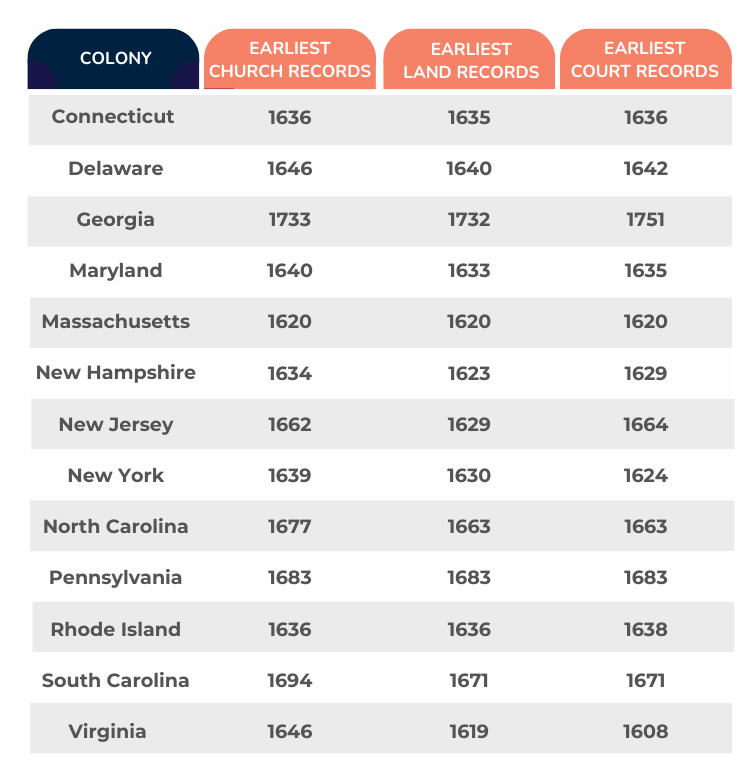Do your family stories reach back to the early settlers of New England, the Southern colonies, or frontier communities before the Revolutionary War? Our genealogists specialize in researching Colonial American ancestors, from the 1600s through the founding of the United States. We help you discover the people who shaped your lineage during the earliest days of American history.

The Colonial Era, spanning roughly 1607 to 1783, was a period of constant growth, migration, conflict, and cultural exchange. During this time, European settlers from England, Scotland, Ireland, Germany, the Netherlands, France, and Spain established communities that laid the foundations for modern America.
Whether your ancestors were Puritans in Massachusetts, Quakers in Pennsylvania, planters in Virginia, enslaved people in South Carolina, or indentured servants in Maryland, records from this era can reveal:
This era also includes transitional research through the 1790 U.S. Census and into the early 19th century, bridging gaps in the historical record.
Colonial research requires deep familiarity with fragmented and often unpublished sources. Our team performs research in:
We tailor each project based on your goals, geography, and what you already know. Our services include:

We work extensively with early American records, including:
We access collections from local, state and federal archives, historical societies, and specialized repositories like the New England Historic Genealogical Society and Library of Virginia.
Knowing when records begin is essential to any successful colonial genealogy project. These record start dates serve as critical markers for genealogists researching ancestors in the 1600s and 1700s. While vital records were not uniformly kept during the colonial period, church, land, and court documents often serve as the earliest available evidence of a person’s presence in the New World.
Below is a helpful reference chart showing the earliest known church, land, and court records for each of the original thirteen British Colonies. These sources provide key entry points for tracing early American ancestors during the 17th and 18th centuries.

The chart above presents a comparative overview of the earliest available colonial records—specifically church, land, and court documents—across the original American colonies. Massachusetts holds the distinction of having the earliest recorded documents in all three categories, with church, land, and court records all beginning in 1620. Virginia follows closely, where land records begin in 1619, court records in 1608—the earliest in that category among all colonies—and church records in 1646.
In New York, church records date to 1639, land records to 1630, and court records to 1624. New Hampshire also provides early documentation, with land records from 1623, church records beginning in 1634, and court records from 1629. Maryland is another colony with early documentation, with land records from 1633, court records from 1635, and church records from 1640.
Connecticut began keeping both church and court records in 1636, with land records slightly earlier in 1635. Rhode Island matches Connecticut with church and land records both beginning in 1636, though court records appear slightly later in 1638. Delaware’s church records begin in 1646, land in 1640, and court in 1642. In contrast, New Jersey, while having land and court records from as early as 1629 and 1664 respectively, does not document church records until 1662.
Further south, North Carolina initiated its records much later, beginning all three categories in the 1660s to 1670s, with church and court records starting in 1677 and 1663 respectively. Pennsylvania initiated all three categories simultaneously in 1683. South Carolina follows with all records—church, land, and court—emerging in 1694 and 1671. Georgia stands as the last of the listed colonies to establish records, with church records from 1733, land records from 1732, and court records appearing in 1751.
Are you trying to bridge the gap between modern records and early American ancestors? Curious whether your family descends from Mayflower passengers, Revolutionary War veterans, or 17th-century settlers?
📬 Contact Us to begin your Colonial American genealogy project. We'll design a custom research plan based on your goals and family history.
Can you trace ancestors who arrived before 1700?
Yes. While record availability varies, we specialize in connecting early immigrants using land grants, court records, and church registers—even before formal vital records existed.
Can you verify lineage for the DAR, SAR, or Mayflower Society?
Absolutely. Several of our professional genealogists are trained by specific lineage societies to meet the admission standards. We can provide fully sourced, lineage-linked documentation suitable for submission to lineage societies.
What if I only have a family surname or general location?
That's a great starting point. We’ll assess what’s known and build a research strategy tailored to your family.